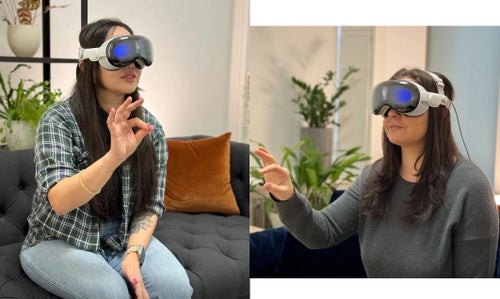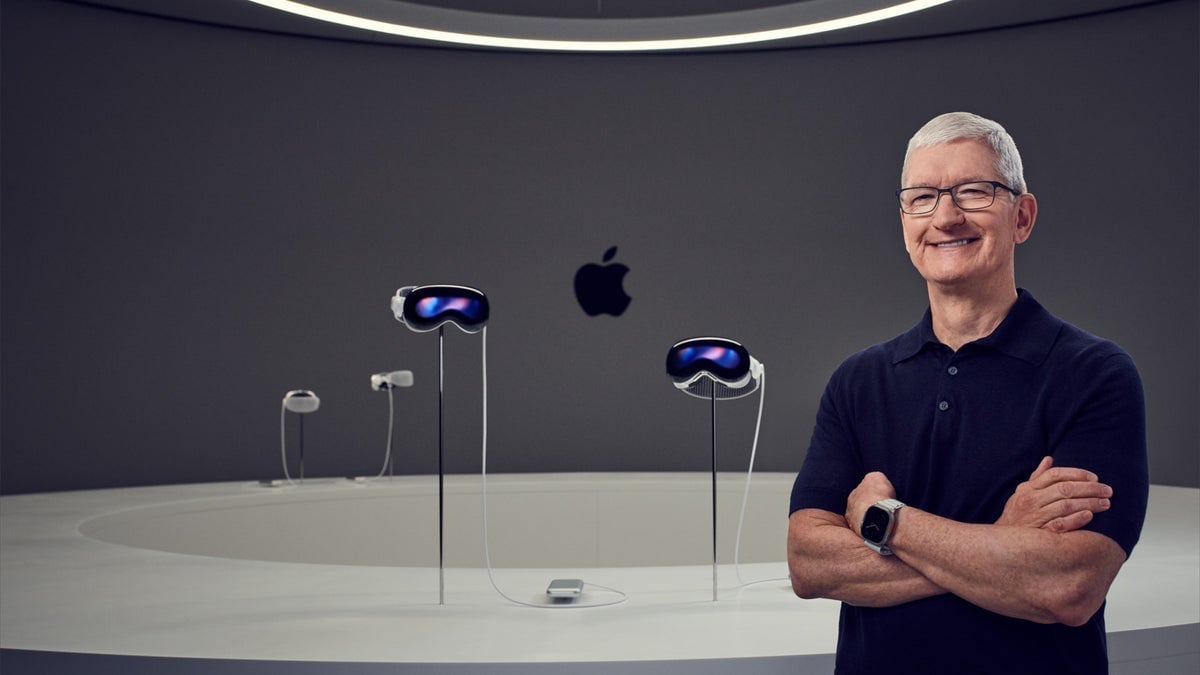- Apple cropped photos of the Vision Pro headset to remove the battery pack, making it look less cumbersome.
- Journalists were not allowed to take photos or videos of the Vision Pro’s hardware during a press briefing.
- Apple sees the cord from the battery pack as getting in the way of making the headset more mobile.
Archive link: https://archive.ph/GYPuS




The screen is also a huge part of the weight issue, because it is literally a smartphone strapped to your head, plus some extra bits so your eyes can focus. It’s heavy, and it’s located on the front of your head. There’s big foam bits touching your face all over. I could definitely not wear this for as long as I’m usually working at my desktop.
Yes, putting the battery somewhere else is a good solution, one I’ve used with my Quest a bunch of times. But if I need to be plugged into a wall to do long stints with a smartphone strapped to my face, what’s the advantage of that over a normal screen?
Then again, I’m a boring old man who just wants more space for text editors and terminal windows. Maybe you kids have found something fun to do with VR.
VR is a “thing,” yes. It is a thing gathering dust on my shelf. It’s fun like Wii Sports is fun, but without the audience. It’s a neat experience but the only truly useful thing I’ve found to do with it is to walk around the streets of a city I’m going to visit so I can orient myself. But that’s hardly something I’d spend $3,500 to do.
Hopefully Apple will find a “killer app” for VR. If I could use this thing to quickly and easily sketch out a remodeling project, I’d love it. But I haven’t found anything on my Quest that can do that, but Apple knows a thing or two about killer apps. Or they did, anyway.
All the ones I’ve seen look like really ridiculously oversized ski goggles. Please link to something like this and I may change my mind.
Have a super miniature, high-intensity display somewhere near the front of the glasses and use mirrors to reflect it into the user’s eye. It would involve incredibly complex eye tracking algorithms to prevent nausea, and that’s going to cost in computing power and energy.
Or use lasers projected onto the lenses at some kind of polarization, which might do a better job of overlaying on bright backgrounds, but suffer the same eye tracking limitation.
Don’t get me wrong, I really want VR. But I want to be in VR for hours at a time, not minutes. And that’s about as long as I can stand to have a cell phone strapped to my face.
This comment is like bitchig and moaning about cars, saying they’re useless because they can’t teleport you.
If VR had some kind of application beyond games the form factor would be less of a problem. But if cars were cumbersome and expensive and only drove to casinos they wouldn’t be useful either.
The screen is only a real factor as weight when the devices are trying to cut costs. The Quest for example, isn’t marketed as a high end product, and even the Quest Pro is cutting corners. One of those corners is the screen.
Take a look at Bigscreen Beyond. They are about the size of swim goggles with the middle filled in. But as I said, they are highly personalized. You likely can’t share them, even with someone who has a similar face shape and eye position. Though they are PCVR and tethered, but as a first iteration by the company it’s pretty decent. They do have a price tag of $1k though.
And I find it odd that you can’t stand VR for more than minutes at a time. I was an early adopter, and while the Oculus DKs were harsh, the CV1 was comfortable enough for me to play for hours on end. The Rift S is still my go to. Though I’m likely going to be snagging a Beyond when I have the cash to spare.
I sweat a lot more than most people and the face mask gets uncomfortably slippery. Plus I don’t like being disconnected from the rest of the world for that long.
So really, this isn’t a “VR is bad” but a “I hate his thing and you should too” rant, huh?
No, more of a “VR would be great but the tech isn’t ready for prime time.”